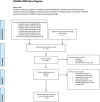The cognitive profile of Friedreich ataxia: a systematic review and meta-analysis
- PMID: 35300598
- PMCID: PMC8928653
- DOI: 10.1186/s12883-022-02615-3
The cognitive profile of Friedreich ataxia: a systematic review and meta-analysis
Abstract
Background: Study the cognitive profile of individuals with Friedreich ataxia (FRDA) and seek evidence for correlations between clinical, genetic and imaging characteristics and neuropsychological impairments.
Methods: Based on PRISMA guidelines, a meta-analysis was realized using the Pubmed and Scopus databases to identify studies (1950-2021) reporting neuropsychological test results in genetically confirmed FRDA and control participants in at least one of the following cognitive domains: attention/executive, language, memory and visuo-spatial functions as well as emotion. Studies using identical outcomes in a minimum of two studies were pooled. Pooled effect sizes were calculated with Cohen's d.
Results: Eighteen studies were included. Individuals with FRDA displayed significantly lower performance than individuals without FRDA in most language, attention, executive function, memory visuospatial function, emotion regulation and social cognitive tasks. Among the included studies, thirteen studies examined the relationship between neuropsychological test results and clinical parameters and reported significant association with disease severity and six studies reviewed the relationship between neuroimaging measures and cognitive performance and mainly reported links between reduced cognitive performance and changes in cerebellar structure.
Conclusions: Individuals with FRDA display significantly lower performances in many cognitive domains compared to control participants. The spectrum of the cognitive profile alterations in FRDA and its correlation with disease severity and cerebellar structural parameters suggest a cerebellar role in the pathophysiology of FRDA cognitive impairments.
Keywords: Cerebellar cognitive affective syndrome; Cerebellum; Cognition; Friedreich ataxia.
© 2022. The Author(s).
Conflict of interest statement
No author reports competing interests.
Figures

Similar articles
-
Fronto-cerebellar dysfunction and dysconnectivity underlying cognition in friedreich ataxia: The IMAGE-FRDA study.Hum Brain Mapp. 2016 Jan;37(1):338-50. doi: 10.1002/hbm.23034. Epub 2015 Oct 27. Hum Brain Mapp. 2016. PMID: 26502936 Free PMC article.
-
Cerebellum and cognition in Friedreich ataxia: a voxel-based morphometry and volumetric MRI study.J Neurol. 2020 Feb;267(2):350-358. doi: 10.1007/s00415-019-09582-9. Epub 2019 Oct 22. J Neurol. 2020. PMID: 31641877
-
The Role of Verbal Fluency in the Cerebellar Cognitive Affective Syndrome Scale in Friedreich Ataxia.Cerebellum. 2024 Oct;23(5):1975-1980. doi: 10.1007/s12311-024-01694-x. Epub 2024 Apr 20. Cerebellum. 2024. PMID: 38642239 Free PMC article.
-
Towards an understanding of cognitive function in Friedreich ataxia.Brain Res Bull. 2006 Jul 31;70(3):197-202. doi: 10.1016/j.brainresbull.2006.06.001. Epub 2006 Jun 21. Brain Res Bull. 2006. PMID: 16861103 Review.
-
Neuropsychiatric symptoms in spinocerebellar ataxias and Friedreich ataxia.Neurosci Biobehav Rev. 2023 Jul;150:105205. doi: 10.1016/j.neubiorev.2023.105205. Epub 2023 May 1. Neurosci Biobehav Rev. 2023. PMID: 37137435 Review.
Cited by
-
Determinant of the cerebellar cognitive affective syndrome in Friedreich's ataxia.J Neurol. 2023 Jun;270(6):2969-2974. doi: 10.1007/s00415-023-11623-3. Epub 2023 Feb 15. J Neurol. 2023. PMID: 36790547
-
Clinical management guidelines for Friedreich ataxia: best practice in rare diseases.Orphanet J Rare Dis. 2022 Nov 12;17(1):415. doi: 10.1186/s13023-022-02568-3. Orphanet J Rare Dis. 2022. PMID: 36371255 Free PMC article.
-
Clinical and cognitive assessment in Friedreich ataxia clinical trials: a review.Front Neurol. 2025 May 22;16:1558493. doi: 10.3389/fneur.2025.1558493. eCollection 2025. Front Neurol. 2025. PMID: 40488204 Free PMC article. Review.
-
Auditory neuropathy in mice and humans with Friedreich ataxia.Ann Clin Transl Neurol. 2023 Jun;10(6):953-963. doi: 10.1002/acn3.51777. Epub 2023 Apr 14. Ann Clin Transl Neurol. 2023. PMID: 37060174 Free PMC article.
-
Reduced cerebello-cerebral functional connectivity correlates with disease severity and impaired white matter integrity in Friedreich ataxia.J Neurol. 2023 May;270(5):2360-2369. doi: 10.1007/s00415-023-11637-x. Epub 2023 Mar 1. J Neurol. 2023. PMID: 36859626 Free PMC article.
References
-
- Anheim M, et al. Epidemiological, clinical, paraclinical and molecular study of a cohort of 102 patients affected with autosomal recessive progressive cerebellar ataxia from Alsace, Eastern France: Implications for clinical management. Neurogenetics. 2010 doi: 10.1007/s10048-009-0196-y. - DOI - PubMed
-
- Campuzano V, et al. Friedreich’s ataxia: autosomal recessive disease caused by an intronic GAA triplet repeat expansion. Science. 1996;271:1423–1427. - PubMed
-
- Durr A, et al. Clinical and genetic abnormalities in patients with Friedreich’s ataxia. N Engl J Med. 1996;335:1169–1175. - PubMed
Publication types
MeSH terms
LinkOut - more resources
Full Text Sources
Medical

